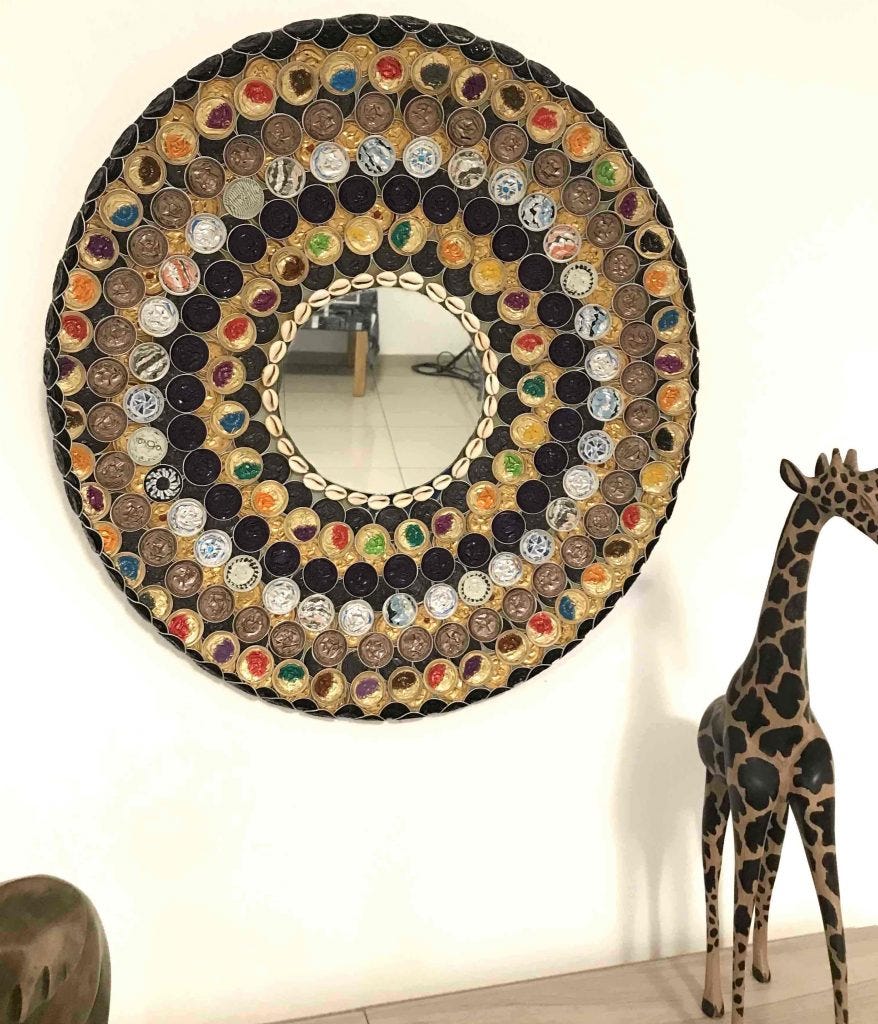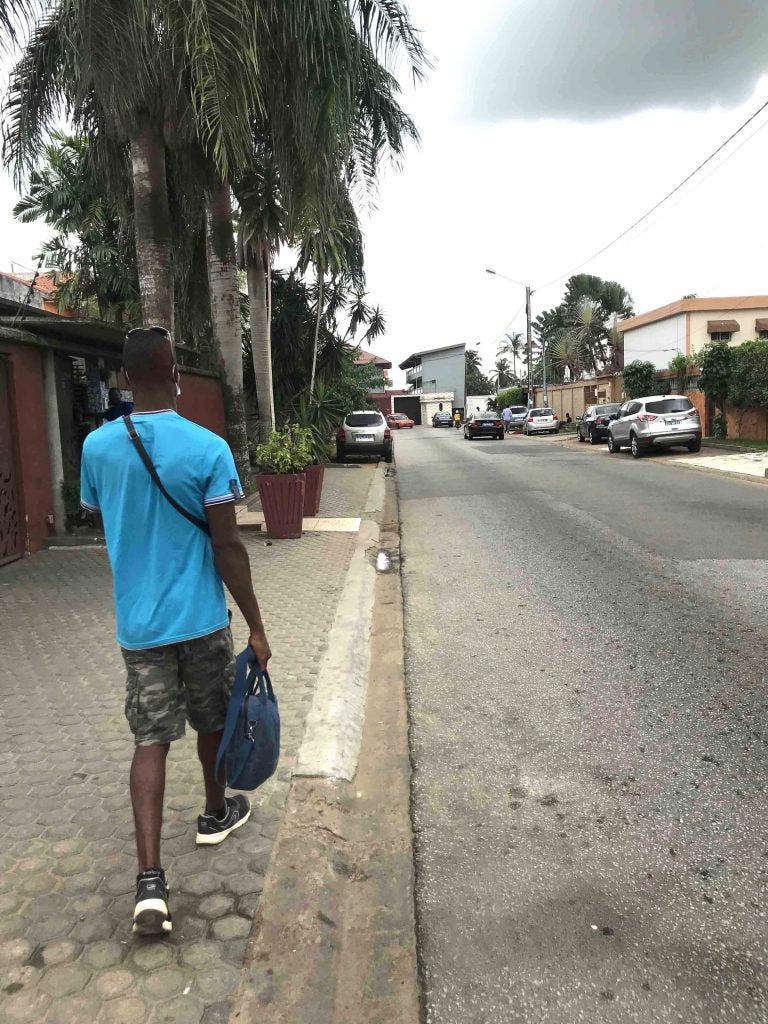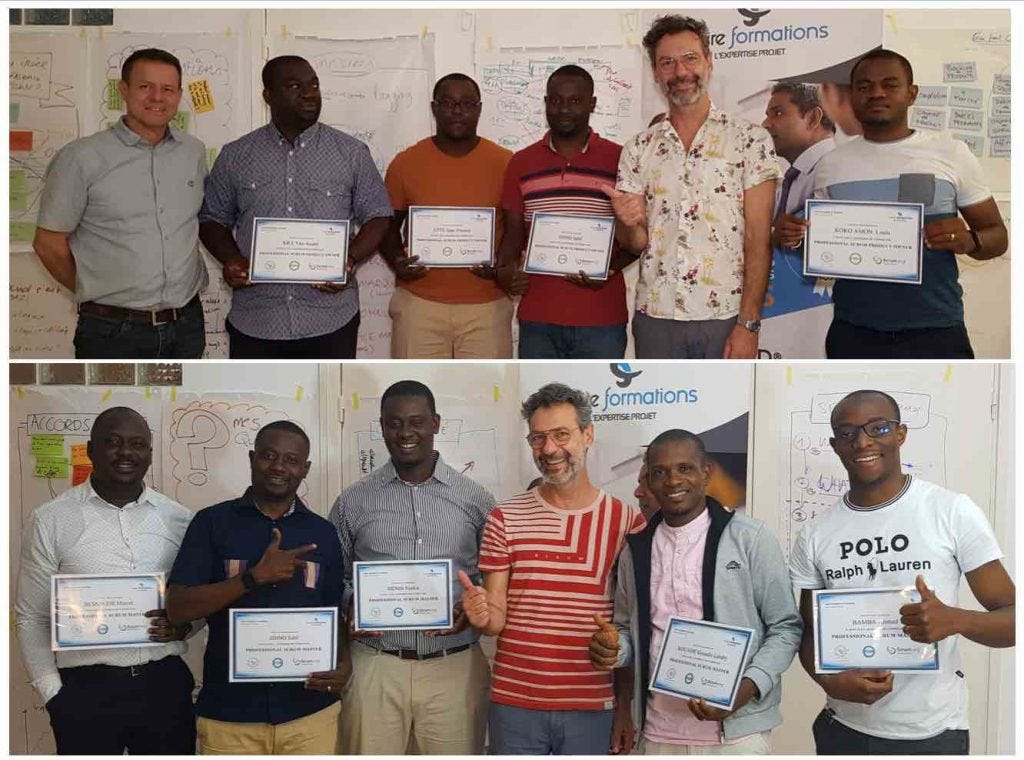
Nothing is what it seems — Photo Roland Flemm
When talking about applying Scrum and Agile, we are hardwired to think about America and Europe, not about Africa. I must confess I am totally ignorant about the status of Scrum and Agile in Africa. Needless to say, I was excited to be invited to Ivory Coast for a PSM-1 and PSPO-1 training in the city of Abidjan.
I was super curious about Agile and Scrum in this African country. Does Agile work there? Can the people grasp and apply the principles underpinning agility? How does their historical background come into play? Will there be strong top-down command and control structures making it impossible for teams to take mandate? Will Scrum work from the perspective of a colonial heritage? And what about transparency? I hear stories that “these countries” are very corrupt. And corruption implies secrecy, getting things done with money or perks. How will that work with respect to the PO role and stakeholder management? What will be the education level of the candidates and what level of Agility or Scrum do they experience? To name but a few questions that popped up…
I had already learned from the local training partner organisation that the people are very proud of their achievements. Even prior to the training, the attendees of my classes had been very active in their social networks advertising that they would be taking a course that is rated highly according to global industry standards. It seemed to me that their attendance was an achievement by itself.

Abidjan traffic — photo by Roland Flemm
Respect
Upon arrival at my apartment, I bump into a first surprising cultural difference. At the doorstep of the apartment, there is a young Ivorian welcoming me and urges me in a friendly way to take my bags. My first instinct is to take them out of the car myself but the French training partner intervenes and allows Marc to carry them for me up the stairs. Once in the apartment, he explains: "This country has a history of long travel by foot, carrying luggage on top of the head. After days of walking trails, it is a custom to show gratitude and hospitality by the host towards the visitor to take the load upon arrival and carry the luggage for the last steps into the host's residence. It is a sign of hospitality toward everybody." I am beginning to suspect there will be more surprises to come.

Marc carrying my bag. Photo by Roland Flemm
Efficiency
Marc will be there every day of my stay, waiting for me under a palm tree, actively monitoring the street to immediately offer his services, and carry my bag during the 25-meter walk to the training facility. That will be his purpose in life during my stay. Paying him would be an insult. Offering me this service seemed very inefficient. The situation felt as if I was a manager objecting to Scrum because “Scrum Teams are not efficient”. This is not about efficiency at all. Through me, Marc gets help, food, shelter, and something to do. My contribution is to allow this system to operate by supporting it.
I am also introduced to Armand. He will be my guide and take me around town and drive me outside the city to see the beach. Armand ensured me he will be there for me 24/7 and I can ask him anything I want. Ivorians really know how to be hospitable!
Empiricism
The second morning, there is no water coming from the tap. I need to improvise. And then the power goes down. I need to improvise more. In the prelude to this experimental journey, I was annoyed that Ivorians have a different view on agreements and appointments than I do. Now I start to understand why: The amount of unknowns in Ivorian life is way bigger than in Europe. Life is more complicated. In this country, people continuously need to solve problems. They need to improvise and take all kinds of unexpected decisions to achieve pretty simple goals like arriving at an appointment.

You see all kinds of surprising things when catching a cab - Photo by Roland Flemm
Everybody is doing their utmost best to provide the best service they can offer, given the circumstances. People are very skillful and creative in solving problems. This makes me very enthusiastic about the agile abilities of this country. And society is forgiving and understands that life is full of challenges and at times things just do not work out as planned. There is room for failure. I think people with such attitudes can become excellent Scrum Team members.
Openness, Courage, Respect and Commitment
In my class, all attendees were highly educated. The local partner shared that only a very small percentage of the working population qualifies for training at this level. Although education is available for everybody, it is not for free. Many parents choose to spend their money on other things rather than their children’s education. Unfortunately, even with a literacy rate of 47%, being illiterate or uneducated is looked down upon by the educated. I observed multiple situations per day where psychological safety was an issue (with me or among each other). I noticed Ivorians have difficulty with the Scrum Values of openness and courage (not telling they do not understand) and respect. In particular too much respect (for educated people). Luckily, Ivorians are excellent problem solvers, and they immediately call for help once “the boss has left the building”. They gather colleagues, friends, and family to try to figure out what it is they need to do. They want to deliver excellent service (commitment) and will solve the problem. However, they fail often because in many cases they do not have a reference of what is expected. Let’s say they need to make a pudding and you gave them the recipe. They will try to make it, but maybe add 1 lt of milk instead of 1 cl because nobody noticed the difference and nobody knows what a pudding should look or taste like anyway… This shows how valuable fast feedback is in a society like this.
There is a cultural difference in dealing with appointments. For Ivorians, the goal of the appointment counts, not the exact meeting time. So if a person does not show up on the agreed time, Europeans might interpret that as being disrespectful. Rest assured that they try to meet you on time, but probably something happened out of their control that causes a delay. At some point, my assistant was unable to arrive on time for an appointment with me. I expected to receive a notification with some explanation for the delay. This did not happen. From his point of view, there was no real need to inform me, as I was relaxing in my comfortable apartment. After talking about it, and explaining that it mattered to me knowing in what way our appointment had to change, he informed me timely about delays. I must say, Ivorians are excellent learners and focus on delivering customer value. But as always, we need to align on what value is.
Hierarchy
There is a strong sense of community but when digging deeper, there is also a strong sense of inequality. Ivory Coast consists of sixty tribes. These tribes were continuously at war with each other until they were united against a common enemy: the French. The French gave them a shared language, a code of conduct and some form of democracy. However, the underlying diverging convictions have not disappeared. I saw the Ivorians reach out and support each other only toward people within their tribe. I also saw how they oppress and patronise members of other tribes and the less fortunate Ivorians. I also experienced multiple times being stopped by a policeman who only would let us continue our way after being paid a bit of cash. I was upset about this abuse of power. However,… My guide explained that the community needs policemen in the streets. However, their salaries are very low and without the community supporting them, there would be chaos. In other words, the system works differently from ours. I have learned that I should pay attention to not being too judgmental and condemn things because they are different from what I am used to.
Autonomous teams
I saw a strong sense of hierarchy. Educated, rich people have stature. They call the shots, they are “le Chef”. Others pay or serve them to influence and get things done. I asked my PSPO class how this would affect promoting servant leadership and autonomy for teams. These people studied medicine and work as PO or team members in Scrum teams in a local branch of an American company. To my surprise, they see Agile as a revolutionary movement. To them, autonomous teams are bringing the power back into the hands of the people, just like it was before the French took over. The training was providing them with the rationale to further discuss organizational change and team autonomy in their branches. I got the impression that team autonomy relates to the way tribes used to operate in ancient days. The tribe lead was not taking decisions, he was wise and was consulted while families carried out work to achieve common goals.
Conclusion

Happy attendees — Photo by Roland Flemm
My first impression of the feasibility for Agile and Scrum in Ivory Coast is very positive. Visiting this country only for a single week made me feel humble and grateful. People are very friendly, versatile and extremely motivated. In general, people have an experimental and Agile mindset.
This country has a lot of potentials and we can help them with good Scrum education so they can create safe environments in which people can empirically get work done. Empowering teams and repositioning the role of management as servant leaders are key. (Which does not sound very much different from the challenges we face in Europe).
Interested in attending a Professional Scrum training? Click here for more info.
